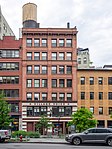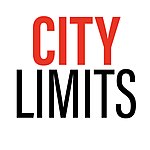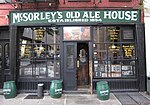Metropolitan Savings Bank Building

The Metropolitan Savings Bank Building opened on May 22, 1867 at the northeast corner of Third Avenue – now Cooper Square – and East 7th Street, in Manhattan, New York City. The building, which was designed by architect Carl Pfeiffer in Second Empire style, is four stories high, 45 feet (14 m) wide and 75 feet (23 m) deep, and was considered at the time it opened to be one of the most finely constructed edifices, "from garret to basement." Its facades were composed of white marble, with the upper floor being enclosed by a mansard roof. The building was fireproof, as no combustible materials were used during construction, either internally or externally. The entire cost of the structure was $150,000. The building was designated a New York City Landmark in 1969, and was added to the National Register of Historic Place in 1979. It has an alternate address of 61 Cooper Square.
Excerpt from the Wikipedia article Metropolitan Savings Bank Building (License: CC BY-SA 3.0, Authors, Images).Metropolitan Savings Bank Building
3rd Avenue, New York Manhattan
Geographical coordinates (GPS) Address Nearby Places Show on map
Geographical coordinates (GPS)
| Latitude | Longitude |
|---|---|
| N 40.728888888889 ° | E -73.990555555556 ° |
Address
Little Free Library
3rd Avenue
10003 New York, Manhattan
New York, United States
Open on Google Maps









